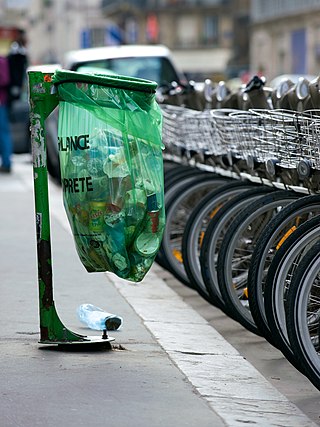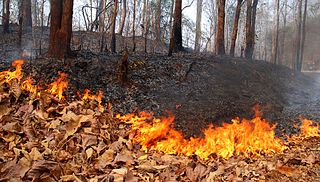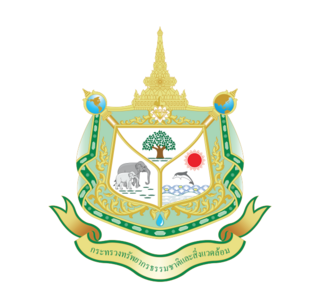
A drinking straw is a utensil that is intended to carry the contents of a beverage to one's mouth. Disposable straws are commonly made from plastics. However, environmental concerns related to plastic pollution and new regulation have led to rise in reusable and biodegradable straws. Following a rise in regulation and public concern, some companies have even voluntarily banned or reduced the number of plastic straws used. Alternative straws are often made of reusable materials like silicone or metal or alternative disposable and biodegradable materials like paper, cardboard, pasta, or bamboo.

Plastic shopping bags, carrier bags, or plastic grocery bags are a type of plastic bag used as shopping bags and made from various kinds of plastic. In use by consumers worldwide since the 1960s, these bags are sometimes called single-use bags, referring to carrying items from a store to a home. However, it is rare for bags to be worn out after single use and in the past some retailers incentivised customers to reuse 'single use' bags by offering loyalty points to those doing so. Even after they are no longer used for shopping, reuse of these bags for storage or trash is common, and modern plastic shopping bags are increasingly recyclable or compostable - at the Co-op for example. In recent decades, numerous countries have introduced legislation restricting the provision of plastic bags, in a bid to reduce littering and plastic pollution.

A plastic bag, poly bag, or pouch is a type of container made of thin, flexible, plastic film, nonwoven fabric, or plastic textile. Plastic bags are used for containing and transporting goods such as foods, produce, powders, ice, magazines, chemicals, and waste. It is a common form of packaging.

Marine debris, also known as marine litter, is human-created solid material that has deliberately or accidentally been released in seas or the ocean. Floating oceanic debris tends to accumulate at the center of gyres and on coastlines, frequently washing aground, when it is known as beach litter or tidewrack. Deliberate disposal of wastes at sea is called ocean dumping. Naturally occurring debris, such as driftwood and drift seeds, are also present. With the increasing use of plastic, human influence has become an issue as many types of (petrochemical) plastics do not biodegrade quickly, as would natural or organic materials. The largest single type of plastic pollution (~10%) and majority of large plastic in the oceans is discarded and lost nets from the fishing industry. Waterborne plastic poses a serious threat to fish, seabirds, marine reptiles, and marine mammals, as well as to boats and coasts.

Thailand's dramatic economic growth has caused numerous environmental issues. The country faces problems with air, declining wildlife populations, deforestation, soil erosion, water scarcity, and waste issues. According to a 2004 indicator, the cost of air and water pollution for the country scales up to approximately 1.6–2.6% of GDP per year. As such, Thailand's economic growth has come at great cost in damage to its people and environment.
Sir Durward Randolph Knowles was a sailor and Olympic champion from The Bahamas. He won the gold medal in the Star class at the 1964 Summer Olympics in Tokyo, together with Cecil Cooke. He won the bronze medal in the same class at the 1956 Summer Olympics in Melbourne. He had previously competed for the United Kingdom in the 1948 Olympics, finishing in 4th place in the Star class together with Sloane Elmo Farrington. Representing the Bahamas, Knowles also won gold in the 1959 Pan American Games star class. He is one of only five athletes who have competed in the Olympics over a span of 40 years, along with fencer Ivan Joseph Martin Osiier, sailor Magnus Konow, showjumper Ian Millar, and sailor Paul Elvstrøm.

The Ministry of Natural Resources and Environment is a cabinet ministry in the Government of Thailand.

Microbeads are manufactured solid plastic particles of less than one millimeter in their largest dimension. They are most frequently made of polyethylene but can be of other petrochemical plastics such as polypropylene and polystyrene. They are used in exfoliating personal care products, toothpastes, and in biomedical and health-science research.
A plastic bag ban or charge is a law that restricts the use of lightweight plastic bags at retail establishments. In the early 21st century, there has been a global trend towards the phase-out of lightweight plastic bags. Single-use plastic shopping bags, commonly made from low-density polyethylene (LDPE) plastic, have traditionally been given for free to customers by stores when purchasing goods: the bags have long been considered a convenient, cheap, and hygienic way of transporting items. Problems associated with plastic bags include use of non-renewable resources, difficulties during disposal, and environmental impacts. Concurrently with the reduction in lightweight plastic bags, shops have introduced reusable shopping bags.

Plastic pollution is the accumulation of plastic objects and particles in the Earth's environment that adversely affects humans, wildlife and their habitat. Plastics that act as pollutants are categorized by size into micro-, meso-, or macro debris. Plastics are inexpensive and durable, making them very adaptable for different uses; as a result, manufacturers choose to use plastic over other materials. However, the chemical structure of most plastics renders them resistant to many natural processes of degradation and as a result they are slow to degrade. Together, these two factors allow large volumes of plastic to enter the environment as mismanaged waste which persists in the ecosystem and travels throughout food webs.
The 5 Gyres Institute is a 501(c)(3) non-profit organization that focuses on reducing plastics pollution by focusing on primary research. Programs concentrate on science, education and adventure. Since 2017, 5 Gyres has been in special consultative status with the United Nations Economic and Social Council. The organization's 2015 Expedition was featured in the 2017 documentary "Smog of the Sea," produced by Jack Johnson, who participated in the voyage.

Proposition 67 was a California ballot proposition on the November 8, 2016 ballot. A "Yes" vote was to approve, and a "No" vote to reject, a statute that prohibits grocery and other stores from providing customers single–use plastic or paper carryout bags but permits the sale of recycled paper bags and reusable bags for a fee.
The Plastic Pollution Coalition (PPC) is an advocacy group and social movement organization which seeks to reduce plastic pollution. PPC operates under the fiscal sponsorship of the umbrella organization Earth Island Institute.
Plastic bag bans in Australia were implemented in the early 21st century by the country’s states and territories, rather than through federal law. The intent of the bans is to help reduce the amount of plastic pollution in the environment, both in and around Australia and globally.

There is no national plastic bag fee or ban currently in effect in the United States. However, the states of California, Colorado, Connecticut, Delaware, Hawaii, Maine, New Jersey, New York, Oregon, Rhode Island, Vermont and Washington and the territories of American Samoa, Guam, Northern Mariana Islands, United States Virgin Islands and Puerto Rico have banned disposable bags. Over 200 counties and municipalities have enacted ordinances either imposing a fee on plastic bags or banning them outright, including all counties in Hawaii.
This article is a summary of developments in health and society during the 2010s
Melati Riyanto Wijsen and Isabel Wijsen are Indonesian climate activists. The two sisters are known for their efforts to reduce plastic consumption in Bali.
Dianna Cohen is an American visual artist and activist. She is the CEO and co-founder of the Plastic Pollution Coalition, an advocacy group and social movement organization which seeks to reduce plastic pollution.
Tiza Mafira is an environmental activist from Jakarta, Indonesia. She initiated the paid plastic bag policy enforced in supermarkets throughout Indonesia, and the Indonesia Plastic Bag Diet Movement with various organizations to raise awareness of the harms of single-use plastic bags. Mafira received the Ocean Heroes Award from the UN Environment.

Ghana Youth Environmental Movement (GYEM), is a national youth-led environmental group in Ghana established in 2012, by a group of young activists led by Gideon Commey, that empowers young people to engage in a sustainable environment and address climate issues through advocacy campaigns and community activities.











